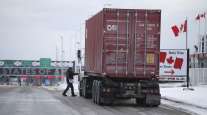Mexico Border Wait Times Spike as Trump's Threats Slow Traffic

The southern border isn’t closed, but already it’s a mess for trucks hauling goods from Mexico to the United States, snarling traffic at some of the busiest frontier crossings in the world.
A week of heated threats from President Donald Trump to “close” the border means Mexican companies are rushing to get as much cargo into the United States as they can, in case of a shutdown. Meanwhile, as many as 750 U.S. Customs and Border Protection officers were reassigned to border patrol sectors in late March, limiting the personnel needed to allow for the flow of goods from south to north.
As a result, wait times to cross the border have soared and can be as many as 10 hours longer than usual.
Trump conceded April 6 in a tweet that traffic and commercial delays will result from “the large scale surge of illegal migrants trying to make their way into the United States.” He added that “until Mexico cleans up this ridiculous & massive migration, we will be focusing on Border Security, not Ports of Entry.”
Despite Trump’s threats — or because of them — Mexico has been cooperating, and “I don’t think we’re going to have an official shutdown,” Larry Kudlow, the top White House economic adviser, said April 7 on CBS’s “Face the Nation.”
While people should take “quite seriously” Trump’s threats to close the border or impose tariffs on the import of vehicles from Mexico if the situation deteriorates, “the worst-case scenarios are off the table for the moment,” Kudlow said.
Kudlow also said he doesn’t think the border dispute will interfere with efforts to pass a renegotiated NAFTA trade deal with Mexico and Canada, and while the timing of a vote is up to Democratic House Speaker Nancy Pelosi, “we believe we will get a vote, and if we get a vote, we will win.”
....Mexico must apprehend all illegals and not let them make the long march up to the United States, or we will have no other choice than to Close the Border and/or institute Tariffs. Our Country is FULL! — Donald J. Trump (@realDonaldTrump) April 8, 2019
Separately, on CNN’s “State of the Union,” Kudlow said it was unlikely Trump would try to reopen negotiations on the so-called U.S.-Mexico-Canada Agreement to add the potential for auto tariffs tied to border issues.
With trucks getting stuck at the border, Mexican companies are being forced to pay more to bring in additional vehicles for loading shipments. While the United States has yet to see meaningful shortages in goods from Mexico, prices for at least one import — avocados — have soared amid worries over a border closure. Buyers of berries, limes and asparagus are making plans to limit potential fallout from such a shutdown.
“The delays have doubled, tripled, quadrupled — it’s not an exact science,” said Jaime Castaneda, vice president for trade policy at the U.S. Dairy Export Council. Lane closures and weekend shutdowns are adding to delays, he said.
The wait times are especially long in El Paso, Laredo and the San Diego area, said Ben Enriquez, senior vice president of Mexico for Transplace, a logistics service provider. In El Paso, it’s taking as long as 12 hours to cross into the United States, up from about one to two hours on a normal day, he said. Usually when one port has congestion problems, trucks can be rerouted to other crossings, but now almost all entry points are confronting similar issues.
Trucks wait in a long line for border customs control to cross into the U.S., caused by the redeployment of border officers to deal with a surge in migrants, at the Otay border crossing in Tijuana, Mexico, April 2, 2019..jpg pic.twitter.com/yM3NgK2DXJ — Boateng Duka Kofi (@DukaKofi) April 4, 2019
“The shippers try to push as much freight as possible and, at the same time, you have fewer officers” from U.S. Customs, Enriquez said. “So, it’s not a good combination.”
The delays are tying up trucks at the border that usually head back south with a load and then are ready to pick up freight again at factories in the interior of Mexico. That’s causing Mexican companies to pay extra to bring in empty trucks to load those goods, he said.
So far, the delays primarily have been for cargoes moving north and aren’t yet impacting southbound shipments of U.S. goods such as meat and dairy. Mexico is the top buyer of American pork.
“Obviously, we want the ports of entry running smoothly,” said Joe Schuele, vice president of the U.S. Meat Export Federation.




